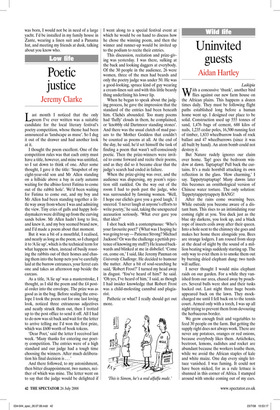Poetic justice
Jeremy Clarke
Last month I noticed that the only poem I’ve ever written was a suitable candidate for the local literary festival’s poetry competition, whose theme had been announced as ‘landscape as muse’. So I dug it out of the drawer and had another look at it.
I thought the poem excellent. One of the competition rules was that each entry must have a title, however, and mine was untitled, so I sat down to think of one. After some thought, I gave it the title: ‘Snapshot of my eight-year-old son and Mr Allen standing on a hillside above a bay in early autumn waiting for the albino ferret Fatima to come out of the rabbit hole’. We’d been waiting for Fatima to come out, and my boy and Mr Allen had been standing together a little way away from where I was and admiring the view. Tiny cries of gulls and happy holidaymakers were drifting up from the curving sands below. Mr Allen hadn’t long to live, and knew it, and my boy seemed brand new, and I’d made a poem about that moment.
But it was a bit of a mouthful, I realised, and nearly as long as the poem, so I changed it to ‘A lie up’, which is the technical term for what happens when, instead of busily rousting the rabbits out of their homes and chasing them into the hemp nets you’ve carefully laid at the burrow entrances, your ferret eats one and takes an afternoon nap beside the carcass.
As a title, ‘A lie up’ was a masterstroke, I thought, as I slid the poem and the £4 postal order into the envelope. The prize was as good as in the bag. Before sealing the envelope I took the poem out for one last loving look, noticed three extraneous adjectives and neatly struck them out, then I trotted up to the post office to send it off. All I had to do now was sit back and wait for the letter to arrive telling me I’d won the first prize, which was £600 worth of book tokens.
‘Dear Poet,’ said the letter I received last week. ‘Many thanks for entering our poetry competition. The entries were of a high standard and our judge had a tough time choosing the winners. After much deliberation his final decision is ... ’ And there followed, to my astonishment, then bitter disappointment, two names, neither of which was mine. The letter went on to say that the judge would be delighted if I went along to a special festival event at which he would be on hand to discuss how he chose the winning poem, and then the winner and runner-up would be invited up to the podium to recite their entries.
This discussion, recitation and prize-giving was yesterday. I was there, sulking at the back and looking daggers at everybody. Of the 30 people in the audience, 26 were women, three of the men had beards and only the poetry judge was under 50. He was a good-looking, spruce kind of guy wearing a cream-linen suit and with this little beardy thing underlining his lower lip.
When he began to speak about the judging process, he gave the impression that the standard of the entries had been beneath him. Clichés abounded. Too many poems had ‘fluffy’ clouds in them, he complained, or ‘knobbly old Dartmoor standing stones’. And there was the usual clutch of mad paeans to the Mother Goddess that couldn’t be counted as poems at all. At the end of the day, he said, he’d set himself the task of finding a poem that wasn’t self-consciously poetic. Then the prize-winners were invited to come forward and recite their poems, and as they did so it became clear that the judge’s search had ended in failure.
When the prize-giving was over, and the audience was dispersing, my poem’s rejection still rankled. On the way out of the room I had to push past the judge, who was surrounded by fawning women. ‘Well, I hope our clichés gave you a good laugh,’ I sneered. ‘I never laugh at anyone’s efforts to write poetry,’ he said, taking the unexpected accusation seriously. ‘What ever gave you that idea?’ I shot back with a contemptuous: ‘Who’s your favourite poet?’ (What was I hoping he was going to say — Patience Strong? Michael Jackson? Or was the challenge a pettish pretence of knowing my stuff?) He leaned backwards and blinked at me in disbelief. ‘Come on, come on,’ I said, like Jeremy Paxman on University Challenge. He decided to humour the nutter. After a bit of soul-searching he said, ‘Robert Frost?’ I turned my head away in disgust. ‘You’ve heard of him?’ he said. ‘Oh yes, I’ve heard of him,’ I said, as though I had insider knowledge that Robert Frost was a child-molesting cannibal and plagiarist.
Pathetic or what? I really should get out more.


























































 Previous page
Previous page